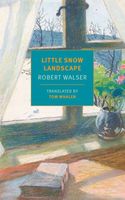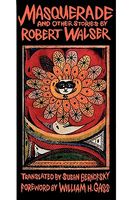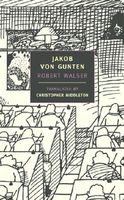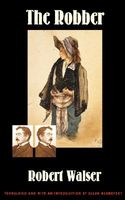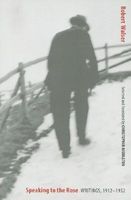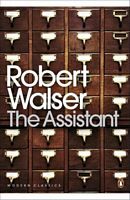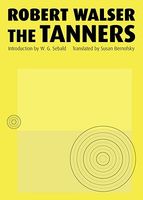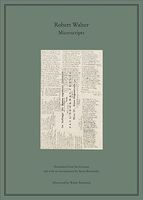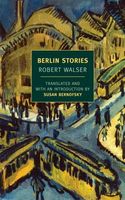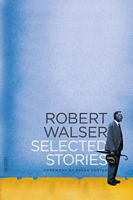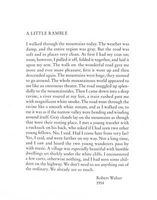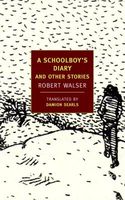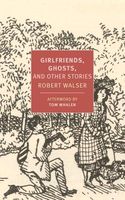- Welcome to FictionDB, Guest
- | My Account
- | Help

Robert Walser
Book List in Order: 18 titles
-
Masquerade and Other Stories
- Feb-1990
- / General Fiction
-
Born in Switzerland in 1878, Robert Walser worked as a bank clerk, a butler in a castle, and an inventor's assistant before discovering what William H. Gass calls his "true profession." From 1899 until he was misdiagnosed a schizophrenic and hospital...
-
Institute Benjamenta
- Oct-1999
- / General Fiction
-
First published in 1908, the novel is a notebook, a boy's impressions of life at a school for servants run by the brother and sister Benjamenta. The lesson of the school is humility and the rejection of power and ambition. With brilliance, Walser cap...
-
Jakob Von Gunten
- Oct-1999
- / General Fiction
-
The Swiss writer Robert Walser is one of the quiet geniuses of twentieth-century literature. Largely self-taught and altogether indifferent to worldly success, Walser wrote a range of short stories, essays, as well as four novels, of which Jakob ...
-
The Robber
- Mar-2000
- / General Fiction
-
The Robber, Robert Walser’s last novel, tells the story of a dreamer on a journey of self-discovery. It is a hybrid of love story, tragedy, and farce, with a protagonist who sweet-talks teaspoons, flirts with important politicians, plays maidservan...
-
Speaking to the Rose: Writings, 1912-1932
- Sep-2005
- / General Fiction
-
The Swiss writer of whom Hermann Hesse famously declared, “If he had a hundred thousand readers, the world would be a better place,” Robert Walser (1878�"1956) is only now finding an audience among English-speaking readers commensurate with his ...
-
The Assistant
- Mar-2008
- / General Fiction
-
The Assistant by Robert Walser -- who was admired greatly by Kafka, Musil, Walter Benjamin, and W. G. Sebald -- is now presented in English for the very first time. Robert Walser is an overwhelmingly original author with many ardent fans: J.M. Coetze...
-
The Tanners
- Aug-2009
- / General Fiction
-
"The Tanners is a contender for Funniest Book of the Year." -- The Village VoiceThe Tanners, Robert Walser’s amazing 1907 novel of twenty chapters, is now presented in English for the very first time, by the award-winning translator Susan Bernofsky...
-
The Microscripts
- May-2010
- / General Fiction
-
W. G. Sebald called Robert Walser “a clairvoyant of the small,” and nowhere is the phrase more apt than in his “microscripts.”
Robert Walser wrote many of his manuscripts in a highly enigmatic, shrunken-down form. These narrow strips o... -
Answer to an Inquiry
- Oct-2010
- / General Fiction
-
Fiction. Art. Translated from the German by Paul North. Illustrated by Friese Undine. The Swiss author Robert Walser's ANSWER TO AN INQUIRY is a short work written in the form of a letter. Walser assumes the voice of a great man of the theater respon...
-
-
Berlin Stories
- Feb-2012
- / General Fiction
-
A New York Review Books OriginalIn 1905 the young Swiss writer Robert Walser arrived in Berlin to join his older brother Karl, already an important stage-set designer, and immediately threw himself into the vibrant social and cultural life of the cit...
-
Selected Stories
- Nov-2012
- / Literary
-
In her preface to Robert Walser’s Selected Stories, Susan Sontag describes Walser as “a good-humored, sweet Beckett.” The more common comparison is to “a comic Kafka.” Both formulations effectively describe the reading experience in these s...
-
A Little Ramble
- Apr-2013
- / General Fiction
-
Over 50 original full-color artworks address newly translated writings of Robert Walser
A Little Ramble: In the Spirit of Robert Walser is a project initiated by the gallerist Donald Young, who saw in Walser an exemplary figure through whom ...
-
The Battle of Sempach
- Jun-2013
- / General Fiction
-
“Beautiful and haunting” �" The New YorkerSwiss modernist author Robert Walser recounts the Battle of Sempach in brief but violent detail.One day, in the middle of high summer, a military expedition was advancing slowly down the dusty ...
-
Fritz Kocher's Essays and Other Stories
- Sep-2013
- / General Fiction
-
A Schoolboy’s Diary brings together more than seventy of Robert Walser’s strange and wonderful stories, most never before available in English. Opening with a sequence from Walser’s first book, “Fritz Kocher’s Essays,” the complete classr...
-
A Schoolboy's Diary and Other Stories
- Sep-2013
- / General Fiction
-
A Schoolboy’s Diary brings together more than seventy of Robert Walser’s strange and wonderful stories, most never before available in English. Opening with a sequence from Walser’s first book, “Fritz Kocher’s Essays,” the complete cla...
-
Girlfriends, Ghosts, and Other Stories
- Oct-2016
- / General Fiction
-
Girlfriends, Ghosts, and Other Stories brings together eighty-one brief texts spanning Robert Walser’s career, from pieces conceived amid his early triumphs to later works written at a psychiatric clinic in Bern. Many were published in the feu...
-
Little Snow Landscape
- Mar-2021
- / General Fiction
-
A collection of previously unpublished short prose by one of the most influential figures of twentieth-century fiction.Little Snow Landscape opens in 1905 with an encomium to Robert Walser’s homeland and concludes in 1933 with a meditation on his c...
